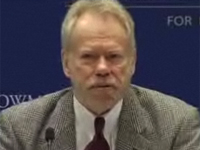Registration
You will receive an email confirming your registration.
A glimpse at recent prominent headlines involving Russia - “Conflict with Georgia”, “Gas Dispute with Ukraine”, “Financial Aid to Kyrgyzstan” - clearly illustrates that Moscow’s evolving agenda in the post-Soviet space can no longer be ignored. The United States must recognize that former Soviet states are and will continue to be an increasingly crucial focus of Russia’s foreign policy.
Dr. Robert H. Legvold elaborated on the internal and external factors shaping relations between Russia and its neighbors. Ambassador (Retired) James F. Collins moderated the discussion.
Influencing Factors
The complex nature of Russia’s relations with its neighbors means that no single aspect frames its agenda completely. Instead Legvold outlined three broad categories that help define Kremlin policy:
- Security
Security concerns such as frozen conflicts, terrorism, role of domestic transformations, the influence of other states on the region, and establishing a strategic Russian frontier all serve to maintain Russia's interest in the affairs of its neighboring states.
- Economics
Russia's interest in expanding its share of energy ties, trade, and investments also serve to keep post-Soviet states as an important element in Russia's economy, and thus foreign policy interests.
- Politics
Russia has an interest in shaping regional politics, especially as relations between post-Soviet countries remain unstable.
Legvold went on to explain the seven issues that have preoccupied Russia in its relations with the former Soviet states for the past five years:
- Restore Russia’s place in the post-Soviet space by enhancing its economic position and offering a security umbrella.
- Impede the U.S. and NATO from establishming strategic positions in the post-Soviet space, while also managing the influence of neighboring countries like China, Turkey, and Iran.
- Dominate the development and export of oil and gas in the region.
- Slow the drift of sub-regions (Central Asia, Caucasus, etc) from the Soviet core toward neighboring regions such as South Asia, East Asia, etc. To that same end, obstruct and end the defection of the post-Soviet states towards NATO.
- Controlling centrifugal forces within the post-Soviet spaces (such as continuing to preserve Soviet links through organizations like the Commonwealth of Independent States).
- Contain regional conflicts within the post-Soviet space.
- Address terrorism within the post-Soviet space.
Unstable Equilibrium
Legvold concluded that the current status of Russia’s relationship with its neighbors is that of an unstable equilibrium. Russia is still the most prominent foreign player in the region, but because its relationships with former Soviet states are constantly changing as Russia tries to assert itself, they remain unstable.
Today the issue that can have the largest affect in altering this equilibrium is the financial crisis. Legvold argued that should Russia be able to withstand the financial crisis, it will be able to establish stronger influence in the region, which will help stabilize relations. If Russia’s economy declines further it is very likely that the equilibrium will become more unstable.
U.S.-Russia Relations via the Former Soviet Space
In order to formulate more effective policies towards the former Soviet region, the U.S. must acknowledge three underlying realities regarding Russia’s relationship with its neighbors.
- Post-Soviet states often do not see eye-to-eye with each other on policy issues.
- The geographic proximity and energy and market dependency that former Soviet states share with Russia will undoubtedly bind these nations together in the foreseeable future.
- Russia's aggressive behavior in the past and today helps push its neighboring states to seek out partnerships with other nations in order to serve as a counterbalance.
Ambassador (Ret) Collins concluded the event by emphasizing that the United States ought to think carefully about what its goals are in the region and to re-examine its relations with post-Soviet states as a regional whole rather than as a series of bilateral relationships.
